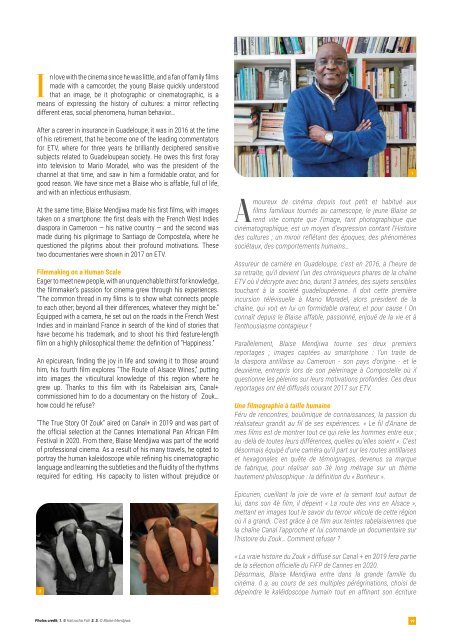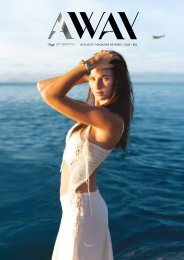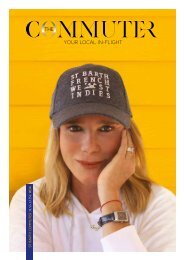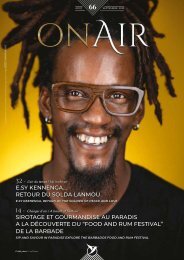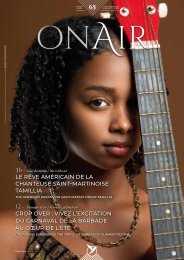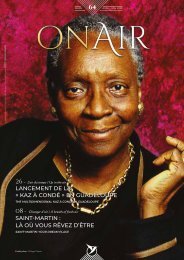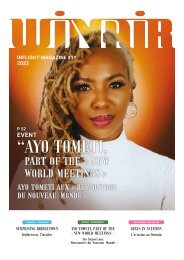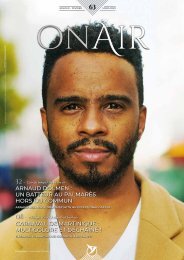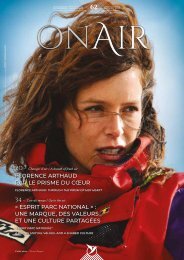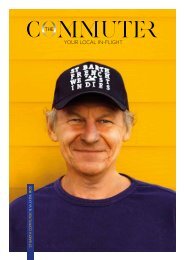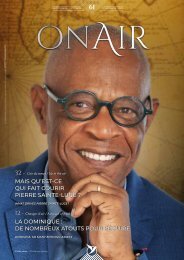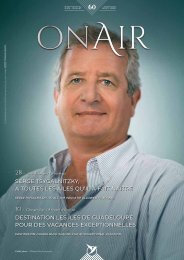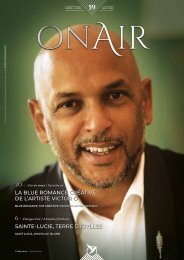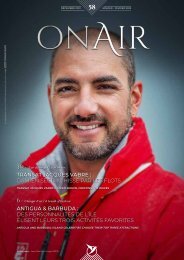You also want an ePaper? Increase the reach of your titles
YUMPU automatically turns print PDFs into web optimized ePapers that Google loves.
In love with the cinema since he was little, and a fan of family films<br />
made with a camcorder, the young Blaise quickly understood<br />
that an image, be it photographic or cinematographic, is a<br />
means of expressing the history of cultures: a mirror reflecting<br />
different eras, social phenomena, human behavior…<br />
After a career in insurance in Guadeloupe, it was in 2016 at the time<br />
of his retirement, that he become one of the leading commentators<br />
for ETV, where for three years he brilliantly deciphered sensitive<br />
subjects related to Guadeloupean society. He owes this first foray<br />
into television to Mario Moradel, who was the president of the<br />
channel at that time, and saw in him a formidable orator, and for<br />
good reason. We have since met a Blaise who is affable, full of life,<br />
and with an infectious enthusiasm.<br />
At the same time, Blaise Mendjiwa made his first films, with images<br />
taken on a smartphone: the first deals with the French West Indies<br />
diaspora in Cameroon — his native country — and the second was<br />
made during his pilgrimage to Santiago de Compostela, where he<br />
questioned the pilgrims about their profound motivations. These<br />
two documentaries were shown in 2017 on ETV.<br />
Filmmaking on a Human Scale<br />
Eager to meet new people, with an unquenchable thirst for knowledge,<br />
the filmmaker’s passion for cinema grew through his experiences.<br />
“The common thread in my films is to show what connects people<br />
to each other; beyond all their differences, whatever they might be.”<br />
Equipped with a camera, he set out on the roads in the French West<br />
Indies and in mainland France in search of the kind of stories that<br />
have become his trademark, and to shoot his third feature-length<br />
film on a highly philosophical theme: the definition of “Happiness.”<br />
An epicurean, finding the joy in life and sowing it to those around<br />
him, his fourth film explores “The Route of Alsace Wines,” putting<br />
into images the viticultural knowledge of this region where he<br />
grew up. Thanks to this film with its Rabelaisian airs, Canal+<br />
commissioned him to do a documentary on the history of Zouk…<br />
how could he refuse?<br />
“The True Story Of Zouk” aired on Canal+ in 2019 and was part of<br />
the official selection at the Cannes International Pan African Film<br />
Festival in 2020. From there, Blaise Mendjiwa was part of the world<br />
of professional cinema. As a result of his many travels, he opted to<br />
portray the human kaleidoscope while refining his cinematographic<br />
language and learning the subtleties and the fluidity of the rhythms<br />
required for editing. His capacity to listen without prejudice or<br />
Amoureux de cinéma depuis tout petit et habitué aux<br />
films familiaux tournés au camescope, le jeune Blaise se<br />
rend vite compte que l’image, tant photographique que<br />
cinématographique, est un moyen d’expression contant l’Histoire<br />
des cultures ; un miroir reflétant des époques, des phénomènes<br />
sociétaux, des comportements humains…<br />
Assureur de carrière en Guadeloupe, c’est en 2016, à l’heure de<br />
sa retraite, qu’il devient l’un des chroniqueurs phares de la chaîne<br />
ETV où il décrypte avec brio, durant 3 années, des sujets sensibles<br />
touchant à la société guadeloupéenne. Il doit cette première<br />
incursion télévisuelle à Mario Moradel, alors président de la<br />
chaîne, qui voit en lui un formidable orateur, et pour cause ! On<br />
connaît depuis le Blaise affable, passionné, enjoué de la vie et à<br />
l’enthousiasme contagieux !<br />
Parallèlement, Blaise Mendjiwa tourne ses deux premiers<br />
reportages ; images captées au smartphone : l’un traite de<br />
la diaspora antillaise au Cameroun - son pays d’origine - et le<br />
deuxième, entrepris lors de son pèlerinage à Compostelle où il<br />
questionne les pèlerins sur leurs motivations profondes. Ces deux<br />
reportages ont été diffusés courant 2017 sur ETV.<br />
Une filmographie à taille humaine<br />
Féru de rencontres, boulimique de connaissances, la passion du<br />
réalisateur grandit au fil de ses expériences. « Le fil d’Ariane de<br />
mes films est de montrer tout ce qui relie les hommes entre eux ;<br />
au -delà de toutes leurs différences, quelles qu’elles soient ». C’est<br />
désormais équipé d’une caméra qu’il part sur les routes antillaises<br />
et hexagonales en quête de témoignages, devenus sa marque<br />
de fabrique, pour réaliser son 3è long métrage sur un thème<br />
hautement philosophique : la définition du « Bonheur ».<br />
1<br />
2<br />
3<br />
Epicurien, cueillant la joie de vivre et la semant tout autour de<br />
lui, dans son 4è film, il dépeint « La route des vins en Alsace »,<br />
mettant en images tout le savoir du terroir viticole de cette région<br />
où il a grandi. C’est grâce à ce film aux teintes rabelaisiennes que<br />
la chaîne Canal l’approche et lui commande un documentaire sur<br />
l’histoire du Zouk… Comment refuser ?<br />
« La vraie histoire du Zouk » diffusé sur Canal + en 2019 fera partie<br />
de la sélection officielle du FIFP de Cannes en 2020.<br />
Désormais, Blaise Mendjiwa entre dans la grande famille du<br />
cinéma. Il a, au cours de ses multiples pérégrinations, choisi de<br />
dépeindre le kaléidoscope humain tout en affinant son écriture<br />
Photos credit: 1. © Katoucha Fall. 2. 3. © Blaise Mendjiwa.<br />
99


